牛津译林版(2020)必修第二册Unit 4 Exploring literature. Welcome to the unit 课件 (共27张PPT)
文档属性
| 名称 | 牛津译林版(2020)必修第二册Unit 4 Exploring literature. Welcome to the unit 课件 (共27张PPT) | 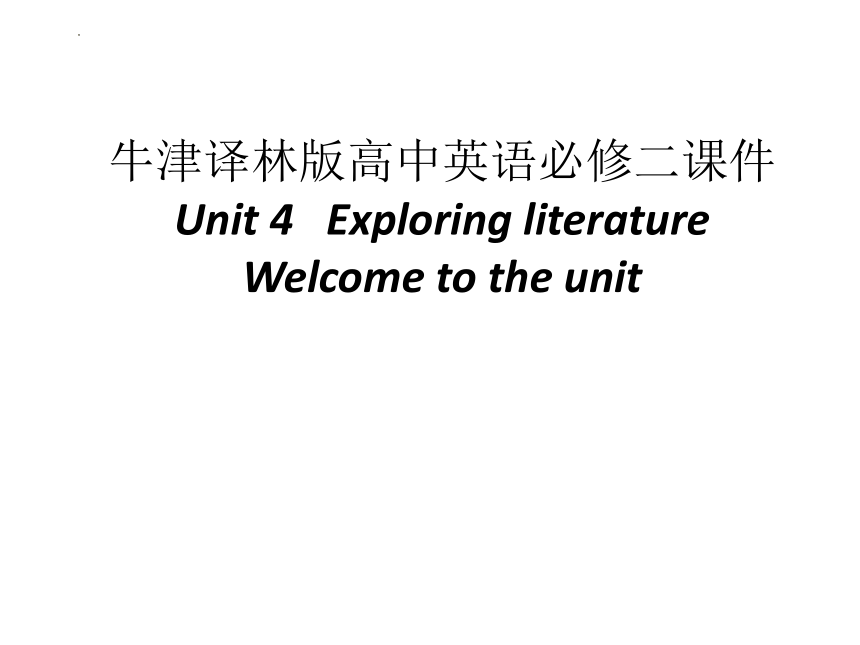 | |
| 格式 | pptx | ||
| 文件大小 | 96.9KB | ||
| 资源类型 | 教案 | ||
| 版本资源 | 牛津译林版(2019) | ||
| 科目 | 英语 | ||
| 更新时间 | 2023-08-03 10:50:01 | ||
图片预览

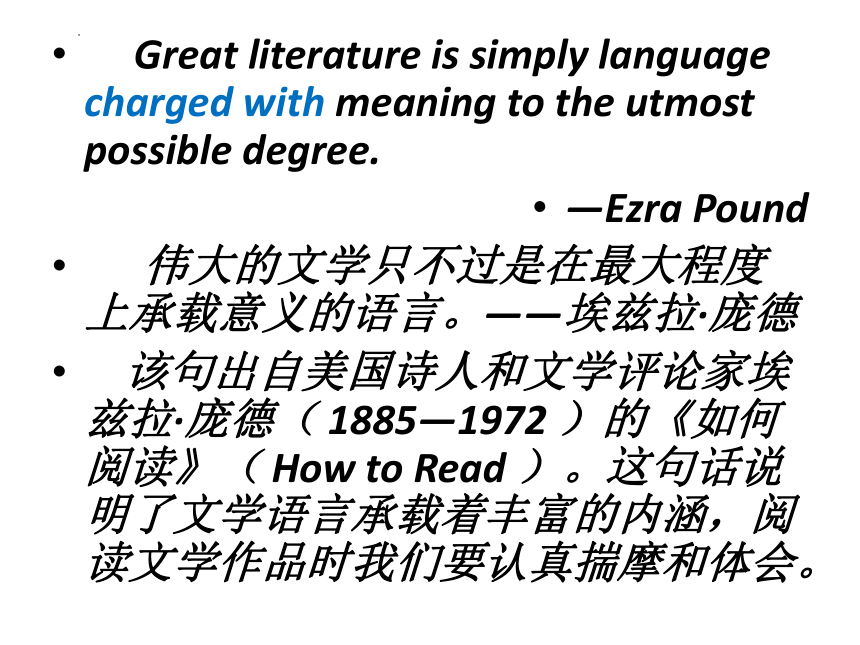
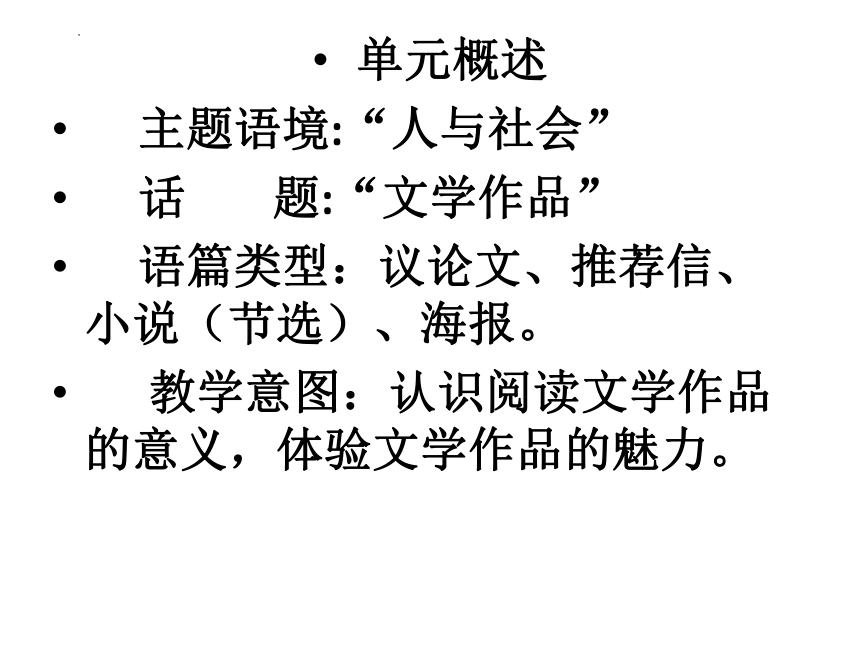
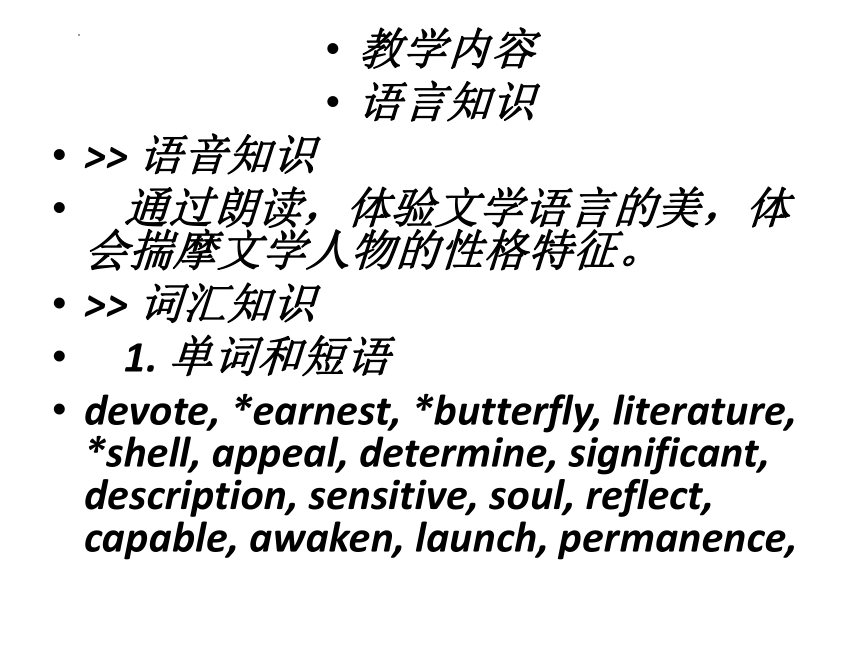
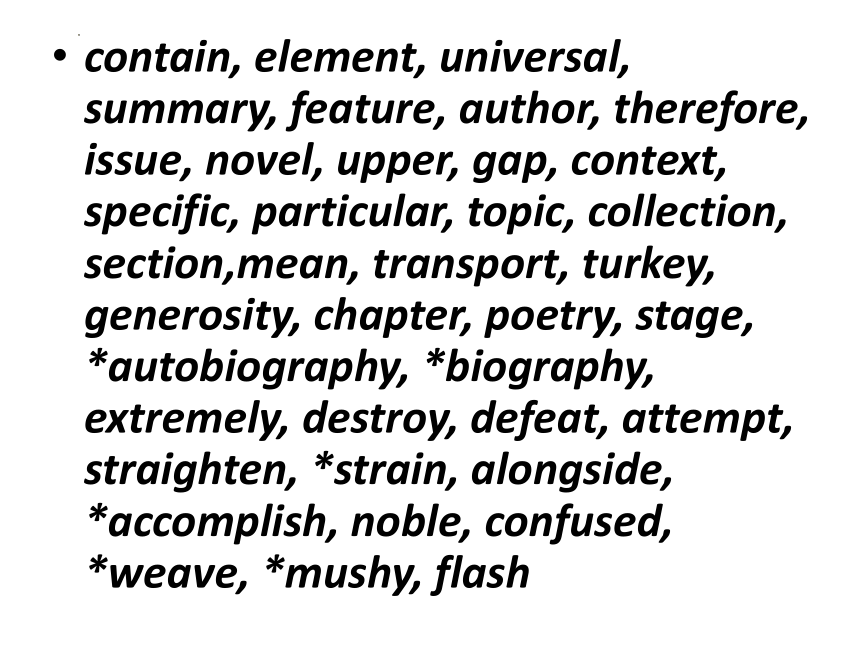
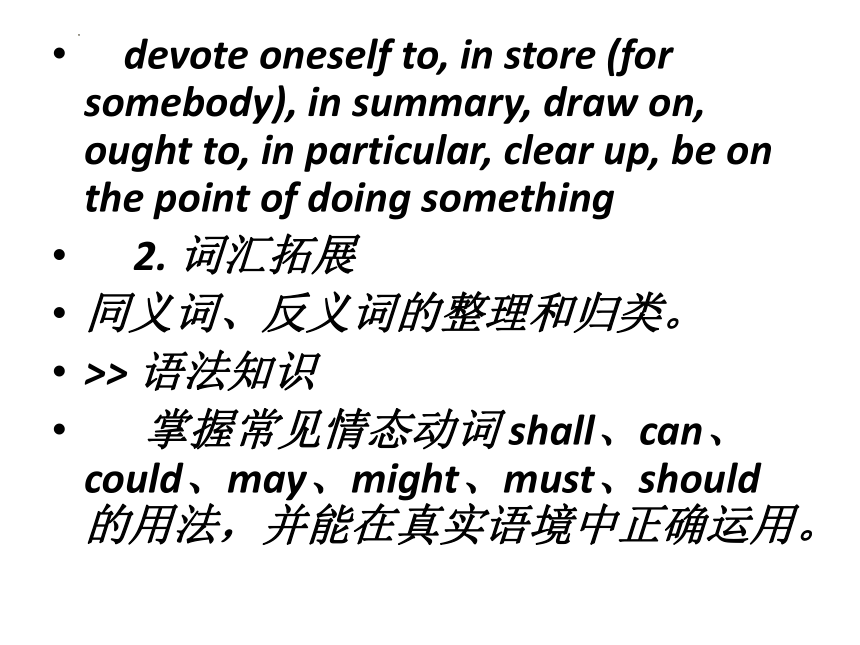
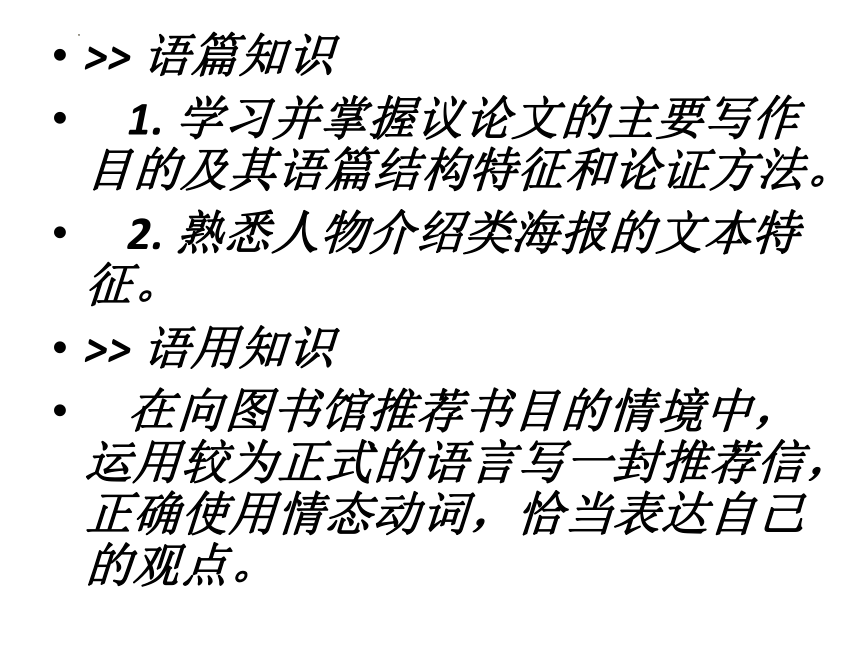
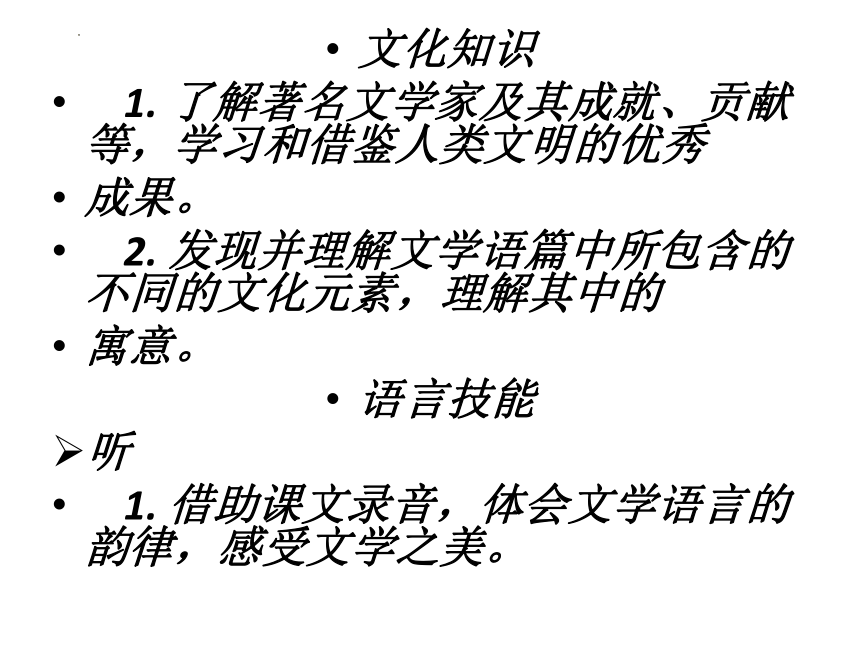
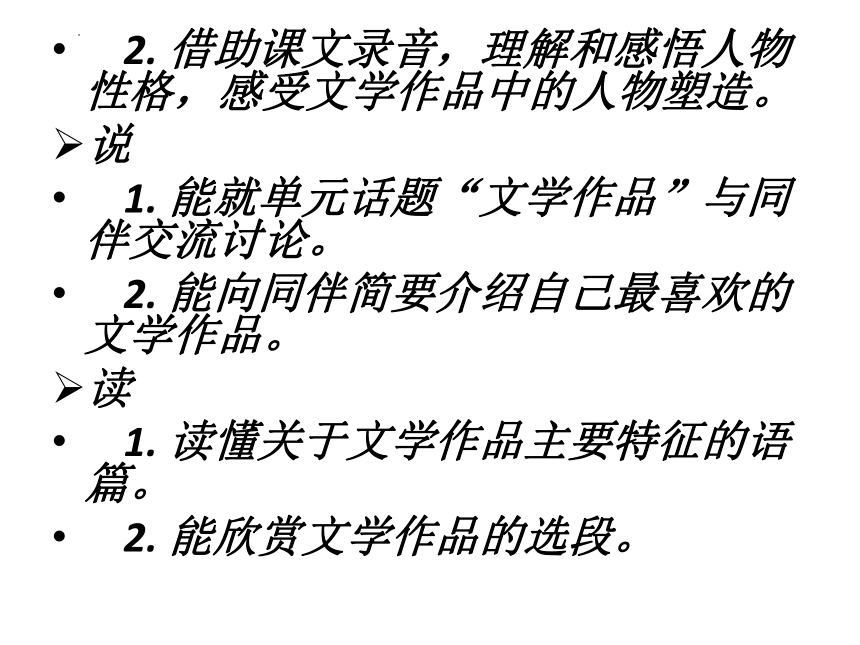
文档简介
(共27张PPT)
牛津译林版高中英语必修二课件
Unit 4 Exploring literature
Welcome to the unit
Great literature is simply language charged with meaning to the utmost possible degree.
—Ezra Pound
伟大的文学只不过是在最大程度上承载意义的语言。——埃兹拉·庞德
该句出自美国诗人和文学评论家埃兹拉·庞德( 1885—1972 )的《如何阅读》( How to Read )。这句话说明了文学语言承载着丰富的内涵,阅读文学作品时我们要认真揣摩和体会。
单元概述
主题语境:“人与社会”
话 题:“文学作品”
语篇类型:议论文、推荐信、小说(节选)、海报。
教学意图:认识阅读文学作品的意义,体验文学作品的魅力。
教学内容
语言知识
>> 语音知识
通过朗读,体验文学语言的美,体会揣摩文学人物的性格特征。
>> 词汇知识
1. 单词和短语
devote, *earnest, *butterfly, literature, *shell, appeal, determine, significant, description, sensitive, soul, reflect, capable, awaken, launch, permanence,
contain, element, universal, summary, feature, author, therefore, issue, novel, upper, gap, context, specific, particular, topic, collection, section,mean, transport, turkey, generosity, chapter, poetry, stage, *autobiography, *biography, extremely, destroy, defeat, attempt, straighten, *strain, alongside, *accomplish, noble, confused, *weave, *mushy, flash
devote oneself to, in store (for somebody), in summary, draw on, ought to, in particular, clear up, be on the point of doing something
2. 词汇拓展
同义词、反义词的整理和归类。
>> 语法知识
掌握常见情态动词 shall、can、could、may、might、must、should 的用法,并能在真实语境中正确运用。
>> 语篇知识
1. 学习并掌握议论文的主要写作目的及其语篇结构特征和论证方法。
2. 熟悉人物介绍类海报的文本特征。
>> 语用知识
在向图书馆推荐书目的情境中,运用较为正式的语言写一封推荐信,正确使用情态动词,恰当表达自己的观点。
文化知识
1. 了解著名文学家及其成就、贡献等,学习和借鉴人类文明的优秀
成果。
2. 发现并理解文学语篇中所包含的不同的文化元素,理解其中的
寓意。
语言技能
听
1. 借助课文录音,体会文学语言的韵律,感受文学之美。
2. 借助课文录音,理解和感悟人物性格,感受文学作品中的人物塑造。
说
1. 能就单元话题“文学作品”与同伴交流讨论。
2. 能向同伴简要介绍自己最喜欢的文学作品。
读
1. 读懂关于文学作品主要特征的语篇。
2. 能欣赏文学作品的选段。
看
获取并整合视频材料中有关学校各图书类型受欢迎程度以及学校购书打算的相关信息。
写
能用得体的语言完成正式信函 —— 推荐信的写作。
学习策略
元认知策略
通过图书馆、互联网等渠道获取与“文学作品”相关的信息,扩充学习资源。
认知策略
结合语篇类型、特点,收集和整理语篇的信息,强化对语篇的解读,加深对语篇的深层理解。
交际策略
在就“文学作品”这一话题进行交流时,监控语言的得体性,根据需要随时做出调整。
情感策略
初步培养文学阅读的习惯,保持对于文学阅读的浓厚兴趣。
单元目标
1. 理解优秀文学作品的特点并认同阅读文学作品对自我发展的意义。
2. 理解情态动词的表意特征,并正确使用情态动词进行意义表达。
3. 写一封正式的书信向图书馆推荐购书目录。
4. 通过阅读文学作品,掌握阅读文学作品的方法,认识优秀文学作品的特征,并体验其魅力。
5. 与同伴合作,完成一张海报,介绍一位作家。
In this unit, we are going to:
read an article about the wonder of literature;
write a letter to recommend books to the school library;
read an excerpt['eks :pt][摘录;节选;(音乐、电影的)片段] from a classic work of literature;
make a poster about a famous writer.
Welcome to the unit
◆ 内容分析
本板块的任务是“名著选段赏析”,教材选取了查尔斯 · 狄更斯的《大卫 · 科波菲尔》和桑德拉 · 希斯内罗丝的《芒果街上的小屋》的两个语段。这两段文字都反映了对生活充满热情的积极人生态度,诠释了面对逆境时应有的心态,与学生生活密切相关。通过对这两段文字的赏析,可以激发学生进一步探究本单元话题的兴趣,为单元学习做好热身。
◆ 教学目标
By the end of this section, we will be able to:
1. interpret the meaning of two excerpts;
2. share with peers their favourite excerpt and give reasons;
3. share with peers their favourite books and give reasons.
1. Classics can stand the test of time (经得起时间的考验). Read the excerpts below from two famous works of literature and discuss the following questions in pairs.
My meaning simply [(引出概括或解释)不过,只是] is, that whatever I have tried to do in life, I have tried with all my heart to do well; that whatever I have devoted myself to, I have devoted myself to completely; that in great aims and in small, I have always been thoroughly in earnest.
—David Copperfield,
by Charles Dickens
我的意思不过是说,我这一生无论做什么,总是全心全意去做,无论我投身做什么,总是完完全全投入。事无巨细,我都认真到底。
with all your heart/your whole heart: completely 完全地;全心全意
I hope with all my heart that things work out for you.
我衷心希望你一切顺利。
in earnest
A. (更加)严肃地,认真地,坚定地
The work on the house will begin in earnest on Monday.这栋房子的修建工作将在星期一正式开始。
B. 郑重其事;当真
You may laugh but I'm in deadly earnest .
你可以笑,不过我可是正经八百的。
I could tell she spoke in earnest.
我看得出她是郑重其事地说的。
You can never have too much sky. You can fall asleep and wake up drunk on sky, and sky can keep you safe when you are sad. Here there is too much sadness and not enough sky. Butterflies too are few and so are flowers and most things that are beautiful. Still, we take what we can get and make the best of it.
—The House on Mango [ m g ] Street,
by Sandra Cisneros
你永远不能拥有太多的天空。你可以在天空下睡去,醒来又沉醉。在你忧伤的时候,天空给你安慰。可是忧伤太多,天空不够。蝴蝶也不够,花儿也不够。大多数美的东西都不够。于是,我们取我们所能取,好好地享用。
drunk with sth (formal) 陶醉;沉醉;飘飘然;忘乎所以
They are currently drunk with success.
他们现在正陶醉于成功之中。
I felt drunk with the excitement of life.
当时我沉醉于生活中的精彩刺激。
make the best of sth/it | make the best of things | make the best of a bad job尽力而为
2. Read the two excerpts on page 43 again and answer the following questions.
1)What message is conveyed in the two excerpts
The excerpt from David Copperfield shows the main character’s passion for whatever he is doing. The other excerpt from The House on Mango Street introduces the concept of making full use of what we have now.
2) Which of the excerpts makes you feel like reading the whole book Why
The second excerpt makes me feel like reading the whole book because I think the language the author uses is simple but beautiful. I particularly like her description of the sky keeping us safe when we are sad.
3) What is your favourite work of literature Why
Of the many works of literature I have read, my favourite by far is The Gadfly《牛虻》by
the Irish writer Ethel Voynich. The story takes place during a revolution in Italy in the 19th century. Through a series of exciting events, the hero, Arthur Burton, comes to terms with his identity and becomes a true revolutionary (革命者). This book is an amazing coming-of-age story(成长故事)that moved me deeply, and I would recommend it to anyone.
come to terms (with sb)
(与某人)达成协议,妥协
come to terms with sth
迁就顺从;接受(令人不快的事物);适应(困难的处境)
She is still coming to terms with her son's death.她还没有完全从儿子死亡的阴影中走出来。
coming of age
成年;成人年龄;成熟;发达
come of age
A. 成年;达到法定年龄
B. 成熟;发达
牛津译林版高中英语必修二课件
Unit 4 Exploring literature
Welcome to the unit
Great literature is simply language charged with meaning to the utmost possible degree.
—Ezra Pound
伟大的文学只不过是在最大程度上承载意义的语言。——埃兹拉·庞德
该句出自美国诗人和文学评论家埃兹拉·庞德( 1885—1972 )的《如何阅读》( How to Read )。这句话说明了文学语言承载着丰富的内涵,阅读文学作品时我们要认真揣摩和体会。
单元概述
主题语境:“人与社会”
话 题:“文学作品”
语篇类型:议论文、推荐信、小说(节选)、海报。
教学意图:认识阅读文学作品的意义,体验文学作品的魅力。
教学内容
语言知识
>> 语音知识
通过朗读,体验文学语言的美,体会揣摩文学人物的性格特征。
>> 词汇知识
1. 单词和短语
devote, *earnest, *butterfly, literature, *shell, appeal, determine, significant, description, sensitive, soul, reflect, capable, awaken, launch, permanence,
contain, element, universal, summary, feature, author, therefore, issue, novel, upper, gap, context, specific, particular, topic, collection, section,mean, transport, turkey, generosity, chapter, poetry, stage, *autobiography, *biography, extremely, destroy, defeat, attempt, straighten, *strain, alongside, *accomplish, noble, confused, *weave, *mushy, flash
devote oneself to, in store (for somebody), in summary, draw on, ought to, in particular, clear up, be on the point of doing something
2. 词汇拓展
同义词、反义词的整理和归类。
>> 语法知识
掌握常见情态动词 shall、can、could、may、might、must、should 的用法,并能在真实语境中正确运用。
>> 语篇知识
1. 学习并掌握议论文的主要写作目的及其语篇结构特征和论证方法。
2. 熟悉人物介绍类海报的文本特征。
>> 语用知识
在向图书馆推荐书目的情境中,运用较为正式的语言写一封推荐信,正确使用情态动词,恰当表达自己的观点。
文化知识
1. 了解著名文学家及其成就、贡献等,学习和借鉴人类文明的优秀
成果。
2. 发现并理解文学语篇中所包含的不同的文化元素,理解其中的
寓意。
语言技能
听
1. 借助课文录音,体会文学语言的韵律,感受文学之美。
2. 借助课文录音,理解和感悟人物性格,感受文学作品中的人物塑造。
说
1. 能就单元话题“文学作品”与同伴交流讨论。
2. 能向同伴简要介绍自己最喜欢的文学作品。
读
1. 读懂关于文学作品主要特征的语篇。
2. 能欣赏文学作品的选段。
看
获取并整合视频材料中有关学校各图书类型受欢迎程度以及学校购书打算的相关信息。
写
能用得体的语言完成正式信函 —— 推荐信的写作。
学习策略
元认知策略
通过图书馆、互联网等渠道获取与“文学作品”相关的信息,扩充学习资源。
认知策略
结合语篇类型、特点,收集和整理语篇的信息,强化对语篇的解读,加深对语篇的深层理解。
交际策略
在就“文学作品”这一话题进行交流时,监控语言的得体性,根据需要随时做出调整。
情感策略
初步培养文学阅读的习惯,保持对于文学阅读的浓厚兴趣。
单元目标
1. 理解优秀文学作品的特点并认同阅读文学作品对自我发展的意义。
2. 理解情态动词的表意特征,并正确使用情态动词进行意义表达。
3. 写一封正式的书信向图书馆推荐购书目录。
4. 通过阅读文学作品,掌握阅读文学作品的方法,认识优秀文学作品的特征,并体验其魅力。
5. 与同伴合作,完成一张海报,介绍一位作家。
In this unit, we are going to:
read an article about the wonder of literature;
write a letter to recommend books to the school library;
read an excerpt['eks :pt][摘录;节选;(音乐、电影的)片段] from a classic work of literature;
make a poster about a famous writer.
Welcome to the unit
◆ 内容分析
本板块的任务是“名著选段赏析”,教材选取了查尔斯 · 狄更斯的《大卫 · 科波菲尔》和桑德拉 · 希斯内罗丝的《芒果街上的小屋》的两个语段。这两段文字都反映了对生活充满热情的积极人生态度,诠释了面对逆境时应有的心态,与学生生活密切相关。通过对这两段文字的赏析,可以激发学生进一步探究本单元话题的兴趣,为单元学习做好热身。
◆ 教学目标
By the end of this section, we will be able to:
1. interpret the meaning of two excerpts;
2. share with peers their favourite excerpt and give reasons;
3. share with peers their favourite books and give reasons.
1. Classics can stand the test of time (经得起时间的考验). Read the excerpts below from two famous works of literature and discuss the following questions in pairs.
My meaning simply [(引出概括或解释)不过,只是] is, that whatever I have tried to do in life, I have tried with all my heart to do well; that whatever I have devoted myself to, I have devoted myself to completely; that in great aims and in small, I have always been thoroughly in earnest.
—David Copperfield,
by Charles Dickens
我的意思不过是说,我这一生无论做什么,总是全心全意去做,无论我投身做什么,总是完完全全投入。事无巨细,我都认真到底。
with all your heart/your whole heart: completely 完全地;全心全意
I hope with all my heart that things work out for you.
我衷心希望你一切顺利。
in earnest
A. (更加)严肃地,认真地,坚定地
The work on the house will begin in earnest on Monday.这栋房子的修建工作将在星期一正式开始。
B. 郑重其事;当真
You may laugh but I'm in deadly earnest .
你可以笑,不过我可是正经八百的。
I could tell she spoke in earnest.
我看得出她是郑重其事地说的。
You can never have too much sky. You can fall asleep and wake up drunk on sky, and sky can keep you safe when you are sad. Here there is too much sadness and not enough sky. Butterflies too are few and so are flowers and most things that are beautiful. Still, we take what we can get and make the best of it.
—The House on Mango [ m g ] Street,
by Sandra Cisneros
你永远不能拥有太多的天空。你可以在天空下睡去,醒来又沉醉。在你忧伤的时候,天空给你安慰。可是忧伤太多,天空不够。蝴蝶也不够,花儿也不够。大多数美的东西都不够。于是,我们取我们所能取,好好地享用。
drunk with sth (formal) 陶醉;沉醉;飘飘然;忘乎所以
They are currently drunk with success.
他们现在正陶醉于成功之中。
I felt drunk with the excitement of life.
当时我沉醉于生活中的精彩刺激。
make the best of sth/it | make the best of things | make the best of a bad job尽力而为
2. Read the two excerpts on page 43 again and answer the following questions.
1)What message is conveyed in the two excerpts
The excerpt from David Copperfield shows the main character’s passion for whatever he is doing. The other excerpt from The House on Mango Street introduces the concept of making full use of what we have now.
2) Which of the excerpts makes you feel like reading the whole book Why
The second excerpt makes me feel like reading the whole book because I think the language the author uses is simple but beautiful. I particularly like her description of the sky keeping us safe when we are sad.
3) What is your favourite work of literature Why
Of the many works of literature I have read, my favourite by far is The Gadfly《牛虻》by
the Irish writer Ethel Voynich. The story takes place during a revolution in Italy in the 19th century. Through a series of exciting events, the hero, Arthur Burton, comes to terms with his identity and becomes a true revolutionary (革命者). This book is an amazing coming-of-age story(成长故事)that moved me deeply, and I would recommend it to anyone.
come to terms (with sb)
(与某人)达成协议,妥协
come to terms with sth
迁就顺从;接受(令人不快的事物);适应(困难的处境)
She is still coming to terms with her son's death.她还没有完全从儿子死亡的阴影中走出来。
coming of age
成年;成人年龄;成熟;发达
come of age
A. 成年;达到法定年龄
B. 成熟;发达
